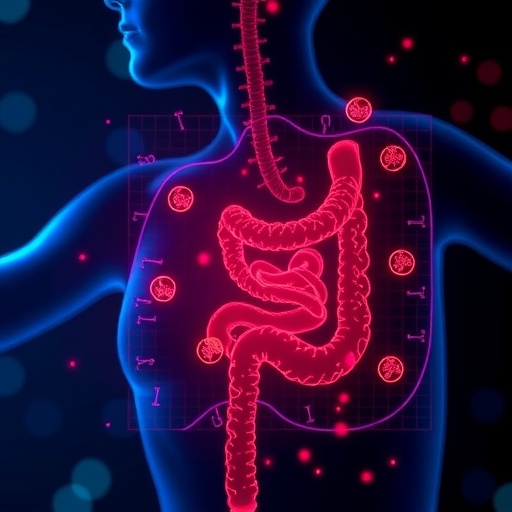A groundbreaking study published in the prestigious journal Aging-US sheds new light on the intricate relationship between biological aging and colorectal cancer (CRC), delivering unprecedented insights into how epigenetic markers can serve as predictive biomarkers for this prevalent malignancy. The research, spearheaded by Su Yon Jung at the University of California, Los Angeles, explores the role of accelerated epigenetic aging as a harbinger of colorectal cancer in postmenopausal women, demonstrating a compelling link between molecular aging processes and tumorigenesis risk.
Epigenetic aging, defined as the measurement of biological age via DNA methylation patterns, offers a nuanced understanding of how cells and tissues deteriorate at the molecular level, independent of chronological age. This research taps into three well-established epigenetic clocks—Horvath’s, Hannum’s, and Levine’s clocks—to quantify DNA methylation age (DNAmAge) from blood samples collected years before any clinical CRC diagnosis. These clocks utilize distinct sets of CpG methylation sites and have been instrumental in aging research by estimating biological aging with exceptional sensitivity.
The study leveraged the extensive Women’s Health Initiative Database for Genotypes and Phenotypes (WHI-dbGaP), focusing on a cohort of postmenopausal white women aged between 50 and 79. These participants provided blood samples that, combined with their health records, allowed researchers to longitudinally assess epigenetic age acceleration (AgeAccelDiff) relative to their chronological age. AgeAccelDiff, representing the deviation of DNAmAge over actual chronological time, serves as an indicator of molecular aging speed, which has now been demonstrated to correlate with colorectal cancer susceptibility.
One of the pivotal discoveries in this research is the strong association between higher epigenetic age acceleration and increased colorectal cancer risk. Women with epigenetic ages that significantly surpassed their chronological counterparts exhibited a marked rise in cancer incidence, emphasizing the potential of DNAmAge as a predictive biomarker. This association was consistent across all three epigenetic clocks used, underscoring the robustness of the findings and validating the biological relevance of these methylation-based aging metrics.
Importantly, the study surfaces the dynamic interplay of lifestyle factors with epigenetic aging and cancer risk. Data revealed that dietary habits, particularly the regular consumption of fruits and vegetables, modify risk trajectories substantially. Women who maintained high fruit and vegetable intake displayed resilience against CRC despite showing molecular signs of accelerated aging. Conversely, those with poor dietary habits and accelerated epigenetic aging experienced dramatically heightened cancer risk—up to 20 times greater in extreme cases. This discovery underscores the potential for lifestyle interventions to mitigate health risks associated with biological aging.
The investigation also highlights reproductive history’s influence on biological aging and cancer susceptibility. Women who underwent bilateral oophorectomy, or removal of both ovaries, prior to natural menopause exhibited elevated epigenetic aging measures. When factored alongside accelerated biological aging, these women faced a significantly amplified risk of CRC. This finding illuminates the intricate connection between hormonal status, reproductive factors, and epigenetic mechanisms in modulating disease vulnerability, opening avenues for personalized risk assessment in clinical settings.
Methodologically, the researchers deployed rigorous statistical models and controlled for potential confounders such as cell composition in blood, verifying their results across multiple independent datasets. Their use of intrinsic epigenetic age acceleration (IEAA), which accounts for cellular heterogeneity, strengthens the assertion that observed methylation changes directly reflect biological aging processes rather than mere shifts in tissue composition. This precision enhances the translational impact of the study, reinforcing the feasibility of epigenetic clocks as clinical tools.
Beyond establishing predictive capability, the research propels forward our understanding of cancer biology through the lens of molecular aging. The demonstration that epigenetic aging precedes CRC diagnosis by many years advocates for earlier detection frameworks incorporating blood-based methylation markers. These novel biomarkers could revolutionize screening programs, enabling interventions at preclinical stages when treatment efficacy is maximized, ultimately improving survival rates among aging populations.
Moreover, the study points to a paradigm shift where cancer risk stratification transcends chronological age, integrating biological age metrics as critical components. It champions a more holistic approach, recognizing that two individuals of identical chronological age may harbor vastly different cancer risks due to divergent molecular aging trajectories influenced by genetics, environment, and lifestyle. This perspective paves the way for personalized medicine strategies that tailor preventive measures based on epigenetic profiles.
The implications of this research extend beyond colorectal cancer, raising compelling questions about the role of epigenetic aging in other malignancies and age-related diseases. The ability to quantify biological aging status offers transformative potential for broader health risk assessment and management, provoking interest in further studies to explore intervention points that could decelerate cellular aging and reduce disease burden.
While these findings herald significant progress, the authors prudently call for independent large-scale replication to substantiate the utility and generalizability of epigenetic aging markers across diverse populations. They also highlight the need for mechanistic studies to unravel the causal pathways linking methylation changes to oncogenic processes, thereby refining biomarker specificity and informing therapeutic targets.
In sum, this landmark study published on July 7, 2025, brings to the forefront the critical importance of biological rather than chronological age in colorectal cancer risk prediction. It underscores the transformative promise of epigenetic clocks in early cancer detection and preventative oncology while advocating for sustained lifestyle interventions as a modifiable buffer against accelerated molecular aging. As the field of epigenetics advances, such integrative approaches hold immense potential to reshape how aging-related diseases are understood, predicted, and ultimately prevented.
Subject of Research: Not applicable
Article Title: Epigenetic age and accelerated aging phenotypes: a tumor biomarker for predicting colorectal cancer
News Publication Date: 7-Jul-2025
Web References: http://dx.doi.org/10.18632/aging.206276
Image Credits: Copyright: © 2025 Jung et al. This is an open access article distributed under the Creative Commons Attribution License (CC BY 4.0)
Keywords: aging, epigenetic aging, pre-diagnostic DNA, DNA methylation–based aging marker, colorectal cancer, carcinogenesis, oophorectomy, diet, postmenopausal women




